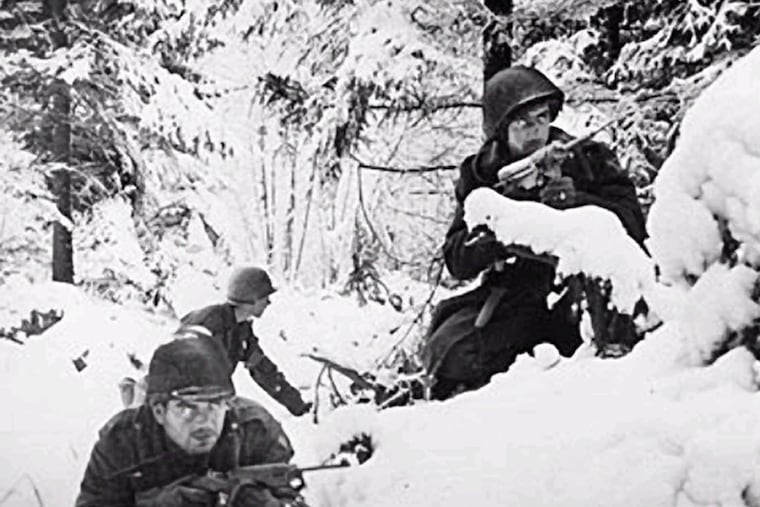70 years later, a decisive battle recalled
World War II's Battle of the Bulge began on Dec. 16, 1944. Remembering that has pained me daily in all these past 70 years.

World War II's Battle of the Bulge began on Dec. 16, 1944. Remembering that has pained me daily in all these past 70 years.
The pain is for my fellow infantrymen, who died in that massive Nazi attack in which I was wounded. It is also for all those civilians and military who were killed, wounded, or otherwise suffered in a global war in defense of freedom against tyranny. Unlike today's jumble of struggles to deal with the ideologically chaotic outbursts of terrorism, in that war our nation had a purpose as clear as it was commendable, and I have never forgotten that either.
In recent years, I have written about that painful memory. It is summarized here as a preface to the other memory I cherish.
The Dec. 16 dawn began at a 14 degrees Fahrenheit, when more than 200,000 German troops attacked 83,000 American soldiers defending an 80-mile front in the Ardennes forest of Luxembourg and Belgium bordering Germany. Hitler's strategy was to mount a massive surprise attack ending with the capture of Antwerp and the surrender of Anglo-American forces. Although the enemy salient ("the Bulge") was extensive, by the end of January 1945, 610,000 American troops had eliminated it. That was our Army's largest World War II land battle, in which it had 89,000 casualties, 19,000 of them deaths.
We were defending a snowy wooded area that first freezing night, when we survivors of what had been our 12-man rifle squad were caught in a meter-by-meter downpour of deadly shrapnel from "screaming meemies" - enemy rocket mortar shells. As a combat infantryman, private first class, my incredibly fortunate fate was to be wounded rather than killed, as were nearby riflemen, who had as much right to live as I. Despite the porous memory of my ancient years, I can never forget the horrifying moment that destroyed their lives but spared mine.
Something else has been unforgettable, but it's as heartwarming as that was heartbreaking.
At 89, I still remember that our involvement in World War II was a time of unified national spirit. With great clarity and singularity of worthy purpose, there was massive agreement about defending freedom. Throughout our civilian and military population, the enormous "war effort" was both vocational and ideological. Government-managed rationing was widely accepted. Illustrating the essential role of civilians in the war effort, "Rosie the Riveter" symbolized the importance of factory labor, and with the blunt truth of their down-to-earth lingo, my fellow soldiers agreed that we were fighting for something worth dying for.
Throughout the nation, military uniforms were as common as civilian garb, and most families had someone in service. In mine, for example, were two sons and two daughters. My older brother, Albert, worked as a chemist, dealing with metal that was crucially important to the war effort. His job was so essential that he was exempt from all military service. Nevertheless, with modesty as genuine as his patriotism, he reflected our family's deep respect for serving the national interest when he resigned from his job, joined the Navy as an officer, and put his life on the line in Pacific combat.
Having saved its democracy, our victorious nation passed it to future generations as their legacy of freedom. No legacy deserves more care, but the discouraging truth is that it has been at risk since we moved into the postwar decades. If the character of our national governance in recent years had a label, it would be gridlock - never agreement. Unfortunately, the recent election results promise more of the same.
Of course, our democracy has always had problems, notably that it wasn't always available to all citizens. For example, like the civilian sector in World War II (and generations before), the armed forces were racially segregated. Despite their lawless exclusion from full citizenship, African Americans in the armed services gave as much of themselves to the cause of freedom as the rest of those who served. The same was true of their role in the civilian war effort.
Yet even in the midst of mistreating millions of citizens, as a nation we were truly united in the cause of human freedom. To have worked or fought for that was to have worked or fought for a civilized life. Our national effort and belief were quite simply inspiring. Unfortunately, that nationwide agreement about such an essential objective has eroded since the end of World War II.
During those war years, America's unanimity in struggling for that cause became as memorable for me as my brush with combat death. Its message was that united is the spiritual note in our nation's name. Would that we could strive once more for such a unanimity of spirit without needing a war to spur us.